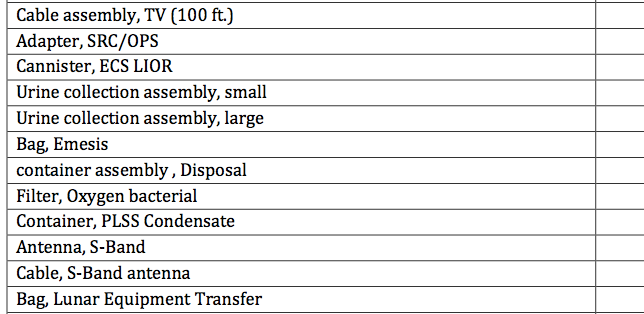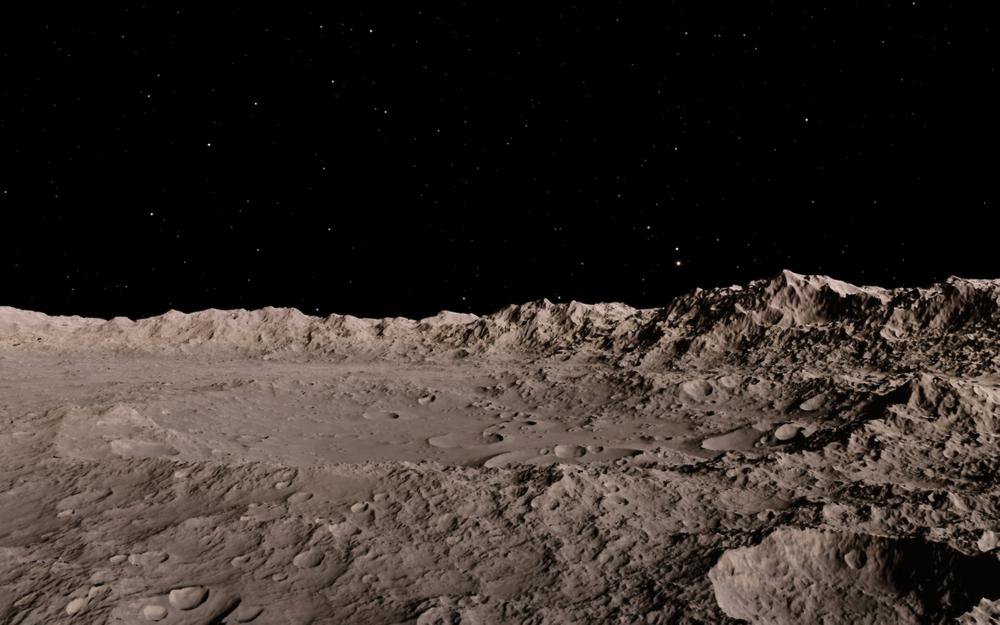Correction, Nov. 28, 2014: This post originally misstated that there are bags of vomit on the moon. This is not true. The post has been updated with newly reported information.
Last week, I cited the BBC and the Atlantic in writing that United States astronauts left bags of vomit—used “emesis bags”—on the moon. A commenter, though, asserted that those bags could have ben empty—that they’d been brought along in the event of sickness but hadn’t been used, and had been discarded, for logistical reasons, on the lunar surface along with a variety of other astro-flotsam.* Wary that Slate have given its readers bad information on the state of moon puke, I wrote to NASA and the Smithsonian National Air and Space Museum to inquirer further. And the truth, it seems, is …
…
… THERE ARE NO BAGS OF PUKE ON THE MOON. Writes Elizabeth Suckow, a contract archivist at the NASA Headquarters History Division:
In response to your query about vomit in the emesis bags left on the moon by the Apollo astronauts, the answer is no. The bags left on the moon were spares. According to Biomedical Results of Apollo, the official published post-program report by the Apollo program physicians, while astronauts have vomited in space, none have done so on a lunar landing mission. The unlucky astronauts are Frank Borman (twice from stomach flu) of Apollo 8, Russell Schweickart (twice from motion sickness) of Apollo 9, and Fred Haise (once from an unknown virus) of Apollo 13. You can find more detail on these incidents and other Apollo in-flight medical issues in Biomedical Results, section 2, chapter 1, available online at http://history.nasa.gov/SP-368/s2ch1.htm.
(You may remember Fred Haise’s illness from the movie Apollo 13, in which he was played by Bill Paxton.)
Suckow’s answer was backed up by Alan Needell of the Air and Space Museum and a lunar researcher Needell contacted named Ulrich Lotzmann. Lotzmann checked the Biomedical Results as well and came to the same conclusion: No astronauts ever vomited during a mission that landed on the moon, so any emesis bags that were left there were empty. (The BBC has since updated its story to clarify that the emesis bag left by Apollo 11 was empty.)

NASA
There are a lot of fun facts in the Biomedical Results, incidentally. For example: Apollo candidates took Rorschach tests during psychological evaluation; astronauts on Apollo 17 used 16 Seconal sleeping tablets during their mission; all but two Apollo crew members reported “a feeling of fullness in the head” while in space; head colds don’t lead to coughing in zero-gravity because the fluid doesn’t leak down into your chest; Apollo 13 commander Jim Lovell—a.k.a. Tom Hanks—lost nearly 14 pounds during his time in space. Most amazingly: Astronauts on the later Apollo missions slept in their landing craft on the surface of the moon.* There are humans who have slept on the moon! Imagine waking up, shaking off unconsciousness, and asking yourself, Where am I? Oh, that’s right, I’m on the motherloving moon.
The nonexistence of moon puke only underscores the disappointment of Apollo 13, which, had it succeeded in landing a craft on the moon, may have left behind a bag of Fred Haise’s vomit.
The good news is we may have just found a new goal for a NASA organization that sometimes seems like it’s been adrift without a bold, inspiring target for years. To paraphrase John F. Kennedy’s famous speech in Houston on Sept. 12, 1962:
Many years ago the great British explorer George Mallory, who was to die on Mount Everest, was asked, why did he want to climb it? He said, “Because it is there.” Well, space is there, and we’re going to climb it, and the moon and the planets are there, and new hopes for knowledge and peace are there. And, therefore, as we set sail we ask God’s blessing on the most hazardous and dangerous and greatest adventure on which man has ever embarked, [putting a bag of yak on the moon].
For a less juvenile outlook on moon studies—specifically its potential as a site of commerce and scientific research, and as a potential staging area for expeditions into deeper space—you can read Kevin Hartnett’s recent “Return to the Moon” piece in the Boston Globe Ideas section. (The article mentions that a Japanese beverage company would like to send its signature product, “Pocari Sweat,” to the moon. If this company is successful, I suggest we blow up the moon, because we would no longer deserve to have a moon.)
Correction, Dec. 1, 2014: In addition to incorrectly stating that used emesis bags were left on the moon, this post also misidentified astronauts’ sleep periods on the moon as “naps.” The astronauts slept for periods up to eight hours. This post also misstated that a Slate commenter said the emesis bags were empty. The commeter said the bags might be empty.
